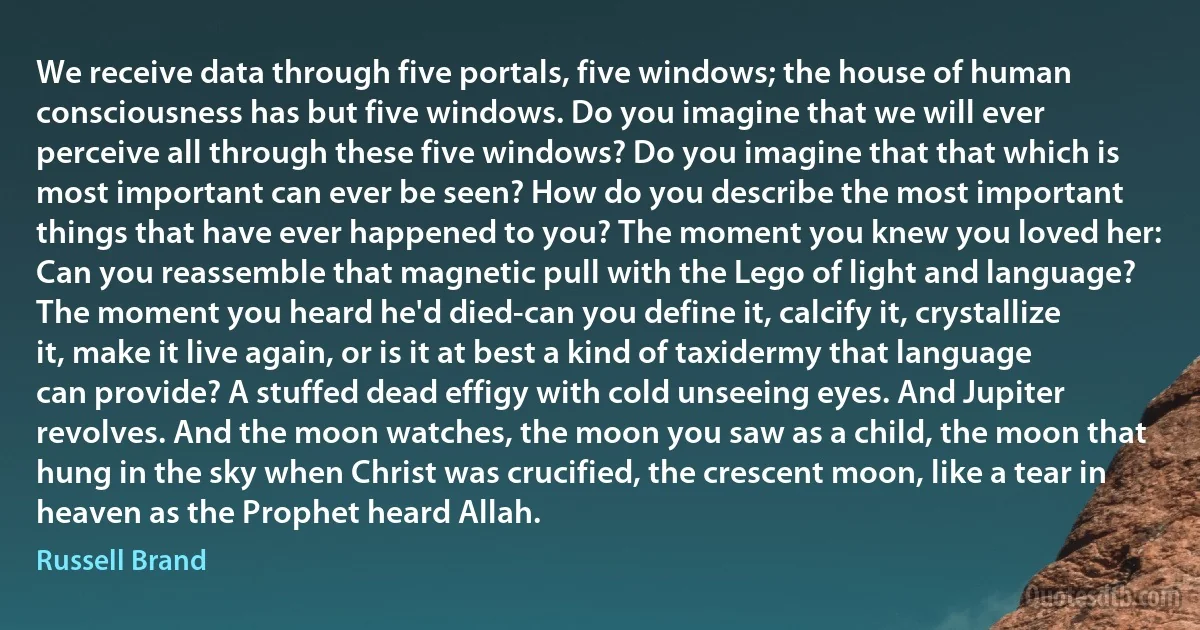
We receive data through five portals, five windows; the house of human consciousness has but five windows. Do you imagine that we will ever perceive all through these five windows? Do you imagine that that which is most important can ever be seen? How do you describe the most important things that have ever happened to you? The moment you knew you loved her: Can you reassemble that magnetic pull with the Lego of light and language? The moment you heard he'd died-can you define it, calcify it, crystallize it, make it live again, or is it at best a kind of taxidermy that language can provide? A stuffed dead effigy with cold unseeing eyes. And Jupiter revolves. And the moon watches, the moon you saw as a child, the moon that hung in the sky when Christ was crucified, the crescent moon, like a tear in heaven as the Prophet heard Allah.
Russell BrandRelated topics
allah best child christ cold crescent datum dead define effigy five hang heaven house human kind language light live magnetic moment moon prophet pull receive saw seen sky tear watches things lego eyesRelated quotes
The darkness crumbles away.
It is the same old druid Time as ever,
Only a live thing leaps my hand,
A queer sardonic rat,
As I pull the parapet's poppy
To stick behind my ear.
Droll rat, they would shoot you if they knew
Your cosmopolitan sympathies.
Now you have touched this English hand
You will do the same to a German
Soon, no doubt, if it be your pleasure
To cross the sleeping green between.
It seems you inwardly grin as you pass
Strong eyes, fine limbs, haughty athletes,
Less chanced than you for life,
Bonds to the whims of murder,
Sprawled in the bowels of the earth,
The torn fields of France.
What do you see in our eyes
At the shrieking iron and flame
Hurled through still heavens?
What quaver--what heart aghast?
Poppies whose roots are in man's veins
Drop, and are ever dropping;
But mine in my ear is safe--
Just a little white with the dust.

Isaac Rosenberg
Poor Joshua! Victim of repeated attacks by an irresponsible, bullying, cowardly, and intemperate father, and abandoned by respondents who placed him in a dangerous predicament and who knew or learned what was going on, and yet did essentially nothing except, as the Court revealingly observes, ante, at 193, "dutifully recorded these incidents in [their] files." It is a sad commentary upon American life, and constitutional principles - so full of late of patriotic fervor and proud proclamations about "liberty and justice for all" - that this child, Joshua DeShaney, now is assigned to live out the remainder of his life profoundly retarded. Joshua and his mother, as petitioners here, deserve - but now are denied by this Court - the opportunity to have the facts of their case considered in the light of the constitutional protection that 42 U.S.C. 1983 is meant to provide."

Harry Blackmun
A fearful thing stood at the cloister's end
And eyed him for a while, then 'gan to wend
Adown the cloisters, and began again
That rattling, and the moan like fiends in pain.
And as it came on towards him, with its teeth
The body of a slain goat did it tear,
The blood whereof in its hot jaws did seethe,
And on its tongue he saw the smoking hair;
Then his heart sank, and standing trembling there,
Throughout his mind wild thoughts and fearful ran:
"Some fiend she was," he said, "the bane of man."
Yet he abode her still, although his blood
Curdled within him: the thing dropped the goat,
And creeping on, came close to where he stood,
And raised its head to him and wrinkled throat.
Then he cried out and wildly at her smote,
Shutting his eyes, and turned and from the place
Ran swiftly, with a white and ghastly face.

William Morris
Suddenly I saw the red blood trickle down from under the Garland hot and freshly and right plenteously, as it were in the time of His Passion when the Garland of thorns was pressed on His blessed head who was both God and Man, the same that suffered thus for me. I conceived truly and mightily that it was Himself shewed it me, without any mean.
And in the same Shewing suddenly the Trinity fulfilled my heart most of joy. And so I understood it shall be in heaven without end to all that shall come there. For the Trinity is God: God is the Trinity; the Trinity is our Maker and Keeper, the Trinity is our everlasting love and everlasting joy and bliss, by our Lord Jesus Christ. And this was shewed in the First and in all: for where Jesus appeareth, the blessed Trinity is understood, as to my sight.

Julian of Norwich
For what advantage is it, that the world enjoys profound peace, if thou art at war with thyself? This then is the peace we should keep. If we have it, nothing from without will be able to harm us. And to this end the public peace contributes no little: whence it is said, ‘That we may lead a quiet and peaceable life.' But if any one is disturbed when there is quiet, he is a miserable creature. Seest thou that He speaks of this peace which I call the third (inner, ed.) kind? Therefore when he has said, ‘that we may lead a quiet and peaceable life,' he does not stop there, but adds ‘in all godliness and honesty.' But we cannot live in godliness and honesty, unless that peace be established. For when curious reasonings disturb our faith, what peace is there? or when spirits of uncleanness, what peace is there?

John Chrysostom
